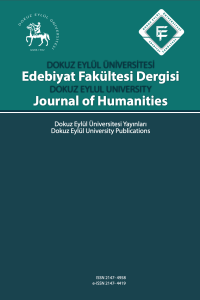Öz
Herhangi bir bağlamdan bağımsız olarak düşünemediğimiz özne, tanımlanan söylemin parçasıdır. Biz ve Ben’in tanımlanmasına yeniden yol açan postmodern durum, her şeyden önce aktörleri bir araya getirmenin bizim için ne kadar zor olacağını gösterme meselesidir. Karşıdakinin tanımı, bir başkasına karşıtlık söylemini ortaya koyarken buradaki bizim tanımımız kendini olumlama söylemiyle ilişkilidir. Biz, yalnızca kurgusal bir tanınma alanı olarak var olur. Yani insanların bir araya gelerek ortak noktalarını paylaştıkları hayalî bir yer. Eğer bu tanınma ve ait olma duyguları iyi bir şekilde sabitleştirilirse akıl resmî olarak mevcut hâle gelir. O andan itibaren ortaklarımız, aynı veya çok benzer hassasiyetle birleşerek yaşama karşı harekete geçebilir. Ancak postmodernistler bu senaryoyu altüst etme riskini taşır. Herhangi bir seferberlik sürecinin gerektirdiği kolektif bağlılık, postmodern biz tarafından yeterince beslenmez. Yalnızca akıl sahibi bir varlık olan öncüsünün aksine, postmodern birey bir arzu varlığıdır. Kişiliğinin duygusal gelişimi, kendi içine kapanmayla kolayca birleşir ve bu da onu kolektif talepler formüle etmekten alıkoyar. Öte yandan bu kimlik çoğulculuğu biz ve ben’in harekete geçirme kapasitesini daha da azaltır. Bu nedenle postmodern tavır, bireyin kimliğini artık sözde evrensel bir normla değil, onu diğerlerinden ayıran şeye göre tanımlamasında ısrar eder. Farklılığa yönelen postmodern kimlik böylece her bireyin arzu ve ihtiyacına uyum sağlamayı ister. Buradan hareketle Postmodern Kimlik’in bu çalışmada yeniden ifade edilmesi simgesel alanda algılanan ve kavranan değişimleri çerçeveleme meselesidir. Fakat her şeyden önce tüm kavram belirsizliklerinin temeller, temsiller ve dil krizi sorununun farkındalığında bu çalışmada öncelikle kimlik ve postmodern kavramının genel bilgilendirmesi verildikten sonra postmodern kimlik birlikteliğinin ne şekilde sunulduğu irdelenecektir.
Anahtar Kelimeler
Kaynakça
- Barth, Fredrık (2001). Etnik Gruplar ve Sınırları. (A. Kaya, Çev.). İstanbul: Bağlam Yayınları.
- Bauman, Zygmunt (2022). Kimlik. (M. Hazır, Çev.). Ankara: Heretik Yayınları.
- Bourdieu, Pierre (2016). Sosyoloji Meseleleri. (F. Öztürk, A. Sümer, M. Gültekin, B. Uçar, Çev.). Ankara: Heretik Yayınları.
- Bourdieu, Pierre (2023). Ders Üzerine Ders. (T. Karakaya, Çev.). Çanakkale: Paradigma Yayınları.
- Eagleton, Terry (2011). Postmodernizmin Yanılsamaları. (M. Küçük, Çev.). İstanbul: Ayrıntı Yayınları.
- Erikson, H. Erik (1982). Enfance et Société. Paris: Delachaux et Nıestlé.
- Funk, Rainer (2023). Ben ve Biz. (Ç. Tanyeri, Çev.). İstanbul: Yapı Kredi Yayınları.
- Goffman, Erving (2014). Damga, Örselenmiş Kimliğin İdare Edilişi Üzerine Notlar. Ankara: Heretik Yayınları.
- Goffman, Erving (2014). Günlük Yaşamda Benliğin Sunumu. (B. Cezar, Çev.). İstanbul: Metis Yayınları.
- Jameson, Fredrıc (2022). Postmodernizm ya da Geç Kapitalizmin Kültürel Mantığı. (C. Gönenç, Çev.). İstanbul: Alfa Yayınları.
- Lyotard, Jean-François (2014). Postmodern Durum. (İ. Birkan, Çev.). Ankara: BilgeSu Yayınları.
- Mauss, Marcel (2011). Sosyoloji ve Antropoloji. (Ö. Doğan, Çev.). Ankara: Doğu Batı Yayınları.
Öz
The subject, which we cannot think independently of any context, is part of the defined discourse. The postmodern situation that leads to the redefinition of "We" and "I" is above all a matter of showing how difficult it will be for us to bring the actors together. While the definition of the other reveals a discourse of opposition to another, our definition here is related to a discourse of self-affirmation. We exist only as a fictional space of recognition. That is, an imaginary place where people come together and share what they have in common. If these feelings of recognition and belonging are well anchored, the mind becomes formally present. From then on, our partners can mobilize against life, united by the same or very similar sensibility. But postmodernists risk upsetting this scenario. The collective commitment required by any mobilization process is not sufficiently nurtured by the postmodern "us". Unlike his predecessor, who was a being of reason alone, the postmodern individual is a being of desire. The emotional development of his or her personality is easily combined with self-absorption, which prevents him or her from formulating collective demands. On the other hand, this pluralism of identity further reduces the mobilizing capacity of we and I. The postmodern attitude therefore insists that the individual no longer defines his or her identity by a supposedly universal norm, but by what distinguishes him or her from others. Postmodern identity, oriented towards difference, thus seeks to adapt to the desires and needs of each individual. From this point of view, the rearticulation of Postmodern Identity in this study is a matter of framing the changes perceived and grasped in the symbolic field. But first of all, in the awareness of all conceptual ambiguities, the problem of foundations and language crisis, this process will first give general information about the concept of identity and postmodern, and then it will be examined how the postmodern identity unity is presented.
Anahtar Kelimeler
Kaynakça
- Barth, Fredrık (2001). Etnik Gruplar ve Sınırları. (A. Kaya, Çev.). İstanbul: Bağlam Yayınları.
- Bauman, Zygmunt (2022). Kimlik. (M. Hazır, Çev.). Ankara: Heretik Yayınları.
- Bourdieu, Pierre (2016). Sosyoloji Meseleleri. (F. Öztürk, A. Sümer, M. Gültekin, B. Uçar, Çev.). Ankara: Heretik Yayınları.
- Bourdieu, Pierre (2023). Ders Üzerine Ders. (T. Karakaya, Çev.). Çanakkale: Paradigma Yayınları.
- Eagleton, Terry (2011). Postmodernizmin Yanılsamaları. (M. Küçük, Çev.). İstanbul: Ayrıntı Yayınları.
- Erikson, H. Erik (1982). Enfance et Société. Paris: Delachaux et Nıestlé.
- Funk, Rainer (2023). Ben ve Biz. (Ç. Tanyeri, Çev.). İstanbul: Yapı Kredi Yayınları.
- Goffman, Erving (2014). Damga, Örselenmiş Kimliğin İdare Edilişi Üzerine Notlar. Ankara: Heretik Yayınları.
- Goffman, Erving (2014). Günlük Yaşamda Benliğin Sunumu. (B. Cezar, Çev.). İstanbul: Metis Yayınları.
- Jameson, Fredrıc (2022). Postmodernizm ya da Geç Kapitalizmin Kültürel Mantığı. (C. Gönenç, Çev.). İstanbul: Alfa Yayınları.
- Lyotard, Jean-François (2014). Postmodern Durum. (İ. Birkan, Çev.). Ankara: BilgeSu Yayınları.
- Mauss, Marcel (2011). Sosyoloji ve Antropoloji. (Ö. Doğan, Çev.). Ankara: Doğu Batı Yayınları.
Ayrıntılar
| Birincil Dil | Türkçe |
|---|---|
| Konular | Modern ve Postmodern Edebiyat, Kültür, Temsil ve Kimlik |
| Bölüm | Makaleler |
| Yazarlar | |
| Erken Görünüm Tarihi | 17 Ekim 2024 |
| Yayımlanma Tarihi | 22 Ekim 2024 |
| Gönderilme Tarihi | 26 Şubat 2024 |
| Kabul Tarihi | 13 Eylül 2024 |
| Yayımlandığı Sayı | Yıl 2024 Cilt: 11 Sayı: 2 |

